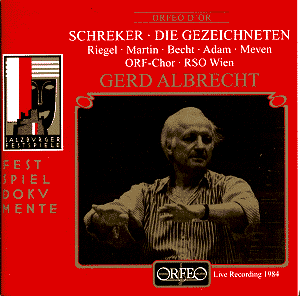Schreker scored a succès d'estime with
his ballet Der Geburtstag der Infantin in 1908. Zemlinsky then
approached Schreker for a libretto on the same plot. Schreker became
so wrapped up in the emotional tensions associated with physical ugliness
obliterating the chances of expressing physical love that the project
fell away. Instead Schreker produced Die Gezeichneten.
The setting is 16th century Genoa. Alviano is the architect
of a temple to debauchery where moneyed profligates have orgies with
abducted women. Tamare is one of the profligates who desires Carlotta
who is a painter and she in turn prefers to catch Alviano's soul in
a painting. Tamare is determined to win Carlotta and Carlotta while
painting Alviano discloses her love. Betrothed to Alviano, Carlotta
repents of her entanglement, now appalled by Alviano's repugnant face.
She goes off with Tamare. Alviano having found them in flagrante
delicto kills Tamare. Carlotta dies calling on the name of Tamare;
Alviano, distraught, collapses into insanity. The large chorus represents
nobles, citizens, soldiers, maids, servants, women, maidens, silent
children, fauns, naiads and bacchantes.
The music is utterly gorgeous - jewelled, mystic, silvery,
haunted, euphorically climactic in episodes
fully worthy of the operas of Korngold, Schoeck (including Massimilla
Doni and Schloss Durande) and Strauss. This is voluptuous
stuff written in the dazzling hey-day of late-romantic opera with a
footing in the twin heritages of Wagner and Puccini. Listen, for example,
on CD1 to the surging flowing romance of the Halloh! Vitelozzo (tr.
3) or the tenderest of orchestral gestures in Holde Martuccia (tr.
5). This is the material which Hollywood was later to mine in light-flooded
scores written for the screen romances of the 1940s by Korngold and
Waxman. The Verwandlung in Act II Track 9 (CD1) is yet another
ultra-romantic and, let's face it, irresistible, affirmation of the
passionately tear-stained musical line that Korngold was to purvey in
Hollywood (e.g. in the marsh music of Elizabeth and Essex and
the great theme from Anthony Adverse). All those who love their
Korngold need to add this set to their shelves as soon as possible.
Get it now before it disappears. If you remain unconvinced then try
listening to CD2 track 6 which is Carlotta's song 'Ah Welche nacht'
in which she is joined by the choir which shines at first quietly and
later with greater passion in an echo from Delius's A Mass of Life.
At the peak moving directly into tr.7 and in Adorno and Carlotta's
duet, there is some unsubtle romance-exalted material but overall this
is grand opera at its hyper-sentimental apex. Wonderful singing from
Becht and Martin but then I did not detect any really weak links in
this cast.
This 1984 performance dates from the first flushed
up-rearing of interest in Schreker and Zemlinsky. At this stage Albrecht
was busy with many such revivals. Two years previously at the same Salzburg
Festival, Albrecht directed a rare revival of Schoeck's Penthesilea.
Austrian Radio's engineers made a superb job of this recording which
has now been digitally remastered. There is the occasional creak and
cough but miraculously few - even in the moments of greatest quiet.
Speaking of which, here is an opera which, for all its superheated storms,
revels in glimmering Baxian webs of orchestration, fine tintinnabulation
and the softest gong impacts. Schreker could not resist ending the work
(CD2 tr. 12) with a hideously retching and yawing apostrophe to inimical
fate.
The set is well documented but sadly I cannot provide
the registers of all the singers as these details are not listed in
the booklet. Only the sung German text is given. There is no English
translation. The notes and a very good synopsis are in both German and
English.
There are other recordings of this work of which only
one is currently available. The deleted Decca recording (444 442-2(3))
was issued in 1993/94 as part of the now cob-webbed and threadbare ‘Entartete
Musik’ series (how about reissuing it at bargain price?); incredible
that it should not have been maintained in the catalogue. The Berlin
Deutsche SO was conducted by Lothar Zagrosek. There is also a still
currently available recording on Marco Polo.
The opera was premiered at Frankfurt-am-Main on 25
April 1918. Its UK premiere came on 31 January 1965 on the Third Programme.
This set should be on the wish-list of every collector
who values their operatic Zemlinsky, Schoeck, Korngold, Pfitzner or
Schreker. I am now all the more regretful that I missed Schreker's Irrelohe
while it was still available on Sony.
Rob Barnett
THE OPERAS OF FRANZ SCHREKER
Der Ferne Klang (1901-3) - Naxos, Capriccio
Das Spielwerk (1916) - not recorded
Die Gezeichneten (1913-15) - Marco Polo, Decca, 1993-94
Der Schatzgräber (1915-18) - Capriccio, 1989
Irrelohe (1919-23) - Sony, 1989
Christophorus, oder Die Vision einer Oper (1924-5, 1928) - unrecorded
Der singende Teufel (1924-28) - unrecorded
Der Schmied von Gent (1929-32) - unrecorded

